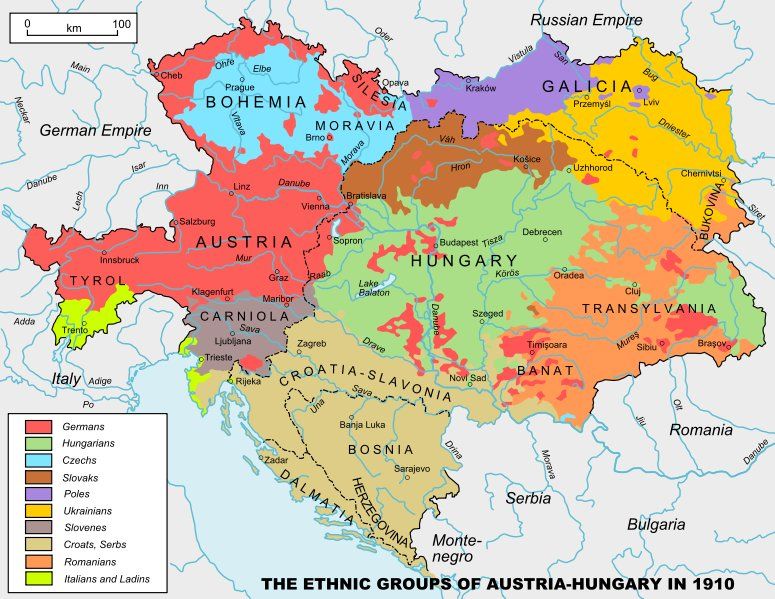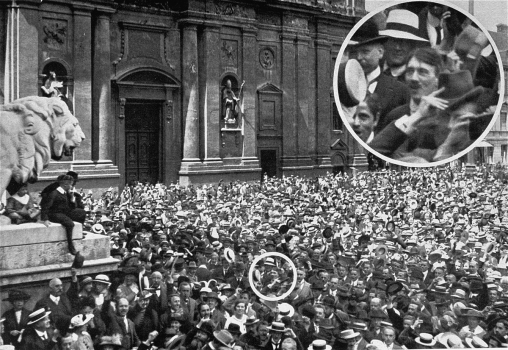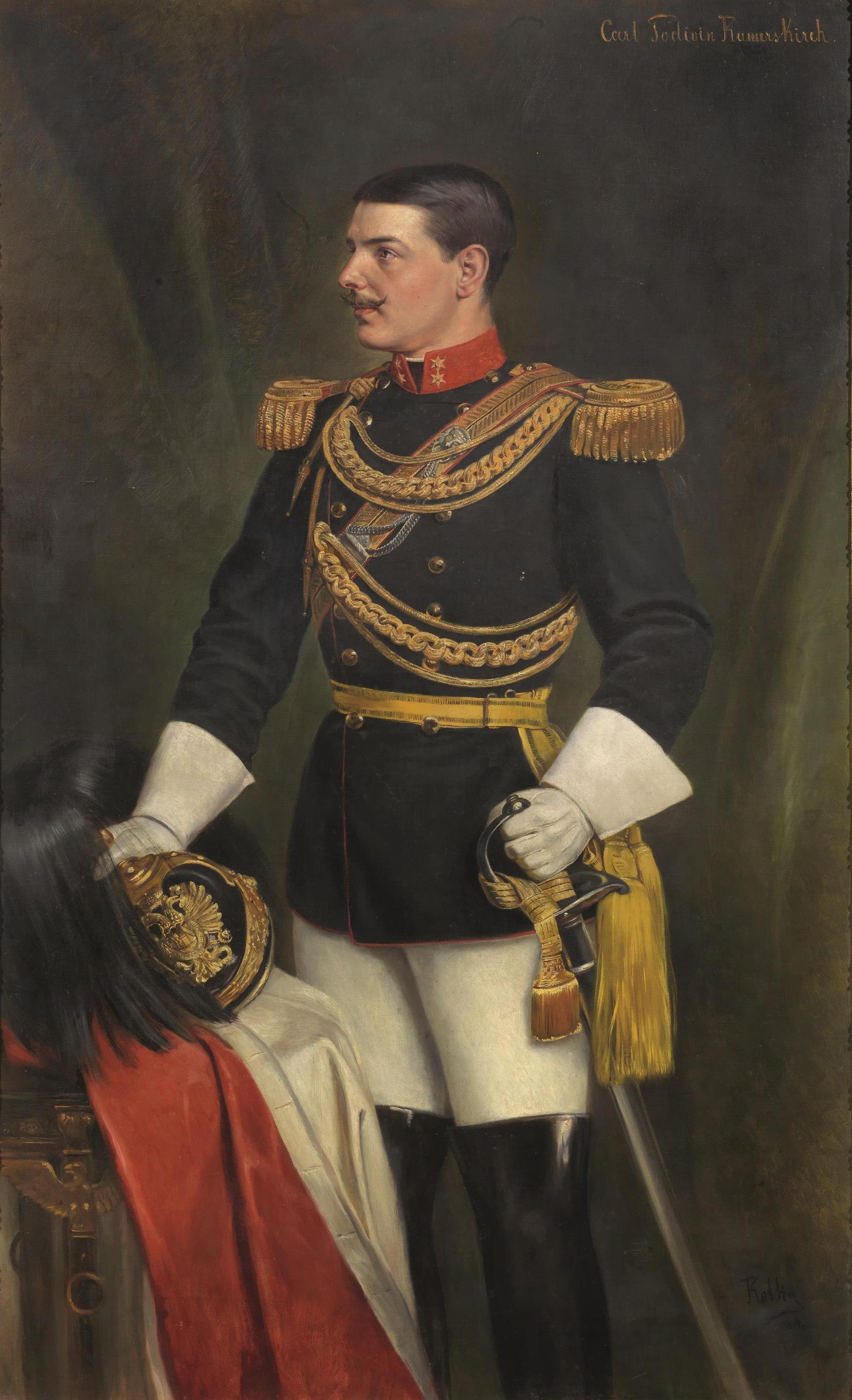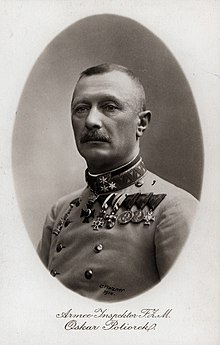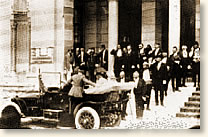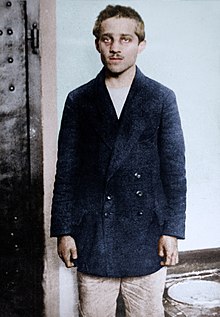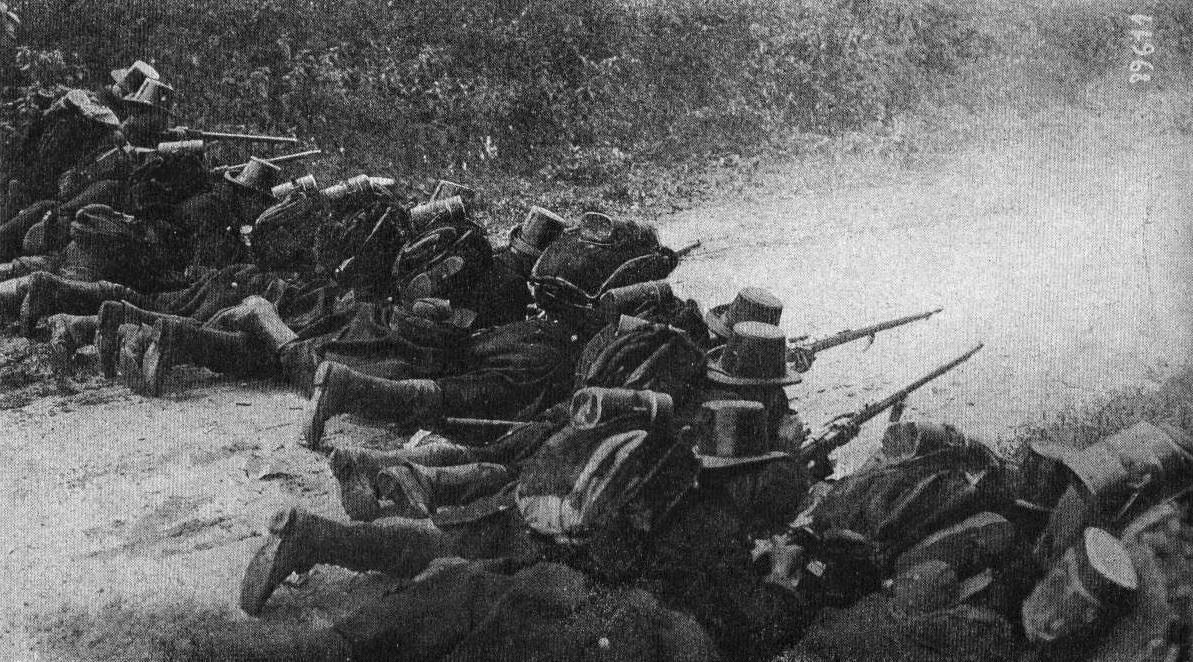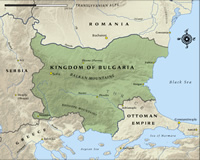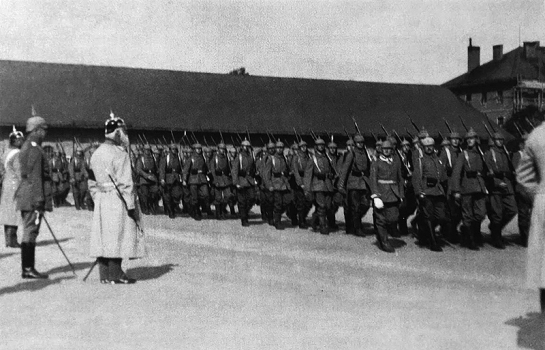It's World War 1 and Hitler had been promoted to lance corporal for his bravery at the Battle of Messines. He would spend his spare time painting the landscapes of war.
The Allies had defeated the Germans at the First Battle of Ypres.
Hitler was decorated with the Iron Cross 2nd Class, which was the happiest day of his life. His regiment was pulled back from the front for rest.
On December 24th, an unofficial truce was declared between the two sides at Christmas.
The German government had made no economic plans for a long war. Germany depended on imports for about a third of her foodstuffs, fodder and fertilizer. World War 1 effected the ability to import goods and Germany became, to a large extent, dependent on what her own farmers could produce. As men and horses were called to battle, farmers’ wives took over the running of the farm, but lack of equipment, fertilizer and manpower, even though some 900,000 prisoners of war worked on the land, saw substantial falls in crop yields. A lack of fodder led to livestock losing weight, impacting on the supply of meat and milk.
Priority was given to providing food for the army and on January 1st, 1915, bread rationing was introduced in Germany. Each citizen and neutral foreign national is issued a bread card for an initial daily quota of 8 ounces.
On February 1st, 1915 Ottoman Turkish army disarmed and segregated Armenian soldiers into labor battalions fearing Christian Armenians were aiding Orthodox Russians in their fight against Turkey.
On February 11, 1915, Hitler was sitting in a dugout when an enemy shell struck. Several men were killed and wounded, but Hitler ended up with only a small scratch to his face.
Around this time Hitler found a small stray dog, which he ended up naming “Foxy”. For the next few years that dog was his closest companion.
In March, several thousand women demonstrated for peace before the German Parliament.
Also in March, the Hitler's regiment was sent into the trenches near Fromelles, France, to defend a two-mile trench line against the British and French. Hitler took on extra duties that put him near the front. The Second Battle of Ypres had begun and the German army initiated the modern era of chemical warfare by launching a chlorine attack on Allied trenches. It was the first successful use of poison gas on the Western Front. Some 5,000 French and Algerian troops were killed.
On May 31st, The first Zeppelin raid on London killed 28 people and injured 60 more. Since Zeppelins flew so high, the raids would continue in London without the risk of being shot down.
On May 23rd, Italy joined the Allies by declaring war on Germany and Austria.
In July, Hitler personally captured three French prisoners.
When the British broke through the lines one day, Hitler was the only volunteer to take a message to the front. Everyone was surprised when he returned alive and well with a message from the front line command.
Another time, Hitler was eating with some men in a dugout when he heard a voice telling him to move to another dugout. Five minutes later a shell exploded in the dugout, killing everyone in it.
On October 2nd, Hitler became a member of the 3rd. Company of the Reserve-Infanterie- Regiment nr. 16.
On October 14th - Bulgaria entered the war by declaring war on Serbia.
On April 22nd, 1916, German troops begin to round up Belgian workers for deportation to Germany for force labor.
On June 24th, 1916, in an effort to draw German troops away from Verdun, the battle of the Somme began. The Allies mounted a major offensive that opened with a large-scale artillery barrage that lasts five days.
Hitler's regiment remained near Fromelles for most of 1916. In July, Hitler dragged a fellow runner back to the trenches during a heavy artillery barrage.
Sometime in August, Romania entered the war on the side of the Allies.
On September 27th, Hitler's regiment was sent to the Somme to join the battle going on there.
On October 5th, at 5 a.m. Hitler was caught out in the open under a British rolling barrage and severely wounded in the thigh by shrapnel. He lay there for hours until a few comrades went to find him and brought him in.
Hitler begged his Lieutenant to let him stay with the regiment, but by the 9th, Hitler was on a hospital train back to Germany. Following his recovery, he went sightseeing in Berlin, then was assigned to light duty in the 2nd Bavarian Infantry Regiment in Munich. He was appalled at the apathy and anti-war sentiment among German civilians. He blamed the Jews for much of this and saw them as conspiring to spread unrest and undermine the German war effort. He wrote to his commanding officer asking that he be recalled to the regiment because he could not tolerate Munich.

On January 19th, 1917, the British intercepted and decoded a telegram from the German Foreign Secretary Arthur Zimmermann promises the return of Texas, New Mexico and Arizona to Mexico as reward for siding with Germany if the U.S. enters the war.
On February 3rd, the United States of America severed diplomatic ties with Germany.
On March 1st, 1917, the United States of America was alerted about the Zimmermann telegram.
On March 5th, Hitler returned back to his regiment nr. 16 on the front near La Bassee. Foxy began to jump around excited to see Hitler. A few soldiers saw Hitler laughing while playing with the dog. That night Hitler was armed with a flashlight and bayonet as he stabbed rats late into the night until someone chucked a boot at him.
On April 6th, the United States entered the war by declaring war on Germany.
In August, Hitler's regiment was sent to Alsace to regroup. On the train ride, a French railroad official offered to buy Hitler' dog. Hitler refused. But, when he got off the train, Hitler could not find Foxy and began to hunt everywhere for his pet. He never found him. Hitler assumed that his beloved friend was stolen.“The swine who took him from me doesn’t know what he did to me.”
While Hitler was hunting for Foxy someone pilfered his knapsack and stole his painting supplies and sketchbook. Hitler never painted again.
In September, Hitler was decorated a second time with the Cross of Merit 3rd Class with Swords for valorous service. At the end of September, he took an 18-day leave and went to Berlin, staying with a comrade’s parents. According to his postcards, he enjoyed the sights and hoped to return to Berlin after the war.
October 23rd, Hitler's Regiment’s fought at the region of the Chemin des Dames.
On December 7th, the United States declares war on Austro-Hungary.
On December 17th, the Russians agreed to peace with the Central powers(Germany, Austria-Hungary, the Ottoman Empire and Bulgaria) and leave the war.
On March 26th, 1918, Hitler's regiment was part of the spring offensive in the area of Fontaine.
On the morning of July 15th, the Germans launched their last great offensive of the war and morale was high. It was the Second Battle of the Marine and Hitler’s regiment took part in it. When the Germans began their advance after an initial artillery bombardment, they found that they had been attacking falls trenches set up by the French. The real front line of trenches lay further on, and had scarcely been touched by the bombardment. As the Germans approached the “real” Allied front lines, they were met with a fierce barrage of French and American fire and they ended up suffering heavy casualties.
On October 15th, 1918 near La Montagne, the regiment was hit hard by a chlorine gas attack that seeped into many of the men’s masks. Hitler was blinded by the gas and held on to another man's coat as that man and others held onto the coat of the man in front of them as they walked single-file to the rear.
Hitler was hospitalized in Pomerania, in Prussia and while he was there recovering, a local minister came into the ward on November 10 to announce that the war was ending the next day at 11 am. The Kaiser, he said, had fled Germany. Hitler said that after the news that "There followed terrible days and even worse nights – I knew that all was lost...in these nights hatred grew in me, hatred for those responsible for this deed."
He wasn't talking about the military, but the politicians back at home in Germany and primarily the Jews he thought responsible.
After World War I, Hitler returned to Munich, but remained in the military. Germany was now a republic and with the abdication of Kaiser Wilhelm and the collapse of the Hohenzollern Monarchy, Germany was also a nation in political and social chaos.
On November 21st,1918, Hitler joined the 7th company of the Ersatz(replacement or reserves?) battalion of the 2nd Infantry Regiment.
In January of 1919, Communists, Socialists and even innocent bystanders were rounded up and murdered in Berlin, and in May in Munich.
On February 12th, 1919, Hitler became a member of the 2nd Demobilmachungs(demobilization) company.
Around February 15th, was the start of Hitler's political career when he was elected as a trusted representative of the Demobilmachungs.
On February 20th, Hitler became a station guard at the Munich Central Railway Station.

The next day Kurt Eisner, leader of the People's State of Bavaria, was shot in the back by German nationalist and right-wing extremist Anton Graf von Arco auf Valley.
Eisner was born to Jewish parents. He studied philosophy, but then became a journalist in Marburg. Then he was contributing editor of the Frankfurter Zeitung, during which time he wrote an article attacking Kaiser Wilhelm II, and for which he spent nine months in prison. Later he joined the Independent Social Democratic Party of Germany at the height of World War I, and was convicted of treason in 1918 for his role in inciting a strike of munitions workers. He spent nine months in Stadelheim Prison, but was released during the General Amnesty in October of that year. After his release he organized the Socialist Revolution that overthrew the monarchy in Bavaria.
On February 20th, 1919, Eisner was on his way to the legislature where he planned announce his resignation as head of state when he was murdered. After his death the elected government of the People's State of Bavaria left Munich and the establishment of the Bavarian Soviet Republic and parliament from April 7th to May 2nd.
By March 8th, Hitler was no longer a station guard.
On April 4th, during the Communist Revolution in Munich at the barracks' council, Hitler was one of the soldiers asked to join the Red Army in active duty. Hitler and most of his friends refused. 10 days later Hitler was nominated as representative of the council.
On May 9th, Hitler went under cover in Munich to help find out if soldiers were part of the Red Army during the revolution. Corporal Hitler had named soldiers in his barracks that supported the Communist uprisings in Munich, resulting in their arrest and executions.
June 5-12, Hitler was sent to a political indoctrination course held at the University of Munich. During which Hitler had asked for the floor and his anti-Semitic outbursts impressed his superior.
In August, Hitler was given the job of lecturing returning German prisoners of war on the dangers of Communism and pacifism, as well as democracy and disobedience. He also delivered tirades against the Jews to the weary soldiers.
In September, Hitler was sent to investigate the German Worker's Party in Munich.
The German Worker's Party was a political party established after World War I. It was a nationalist, pro-military, anti-Semitic party made up of working class people. It was the precursor of the Nazi Party.
On September 12th, 1919, Hitler went to a meeting of the German Workers' Party in the back room of a Munich beer hall. Dressed in civilian attire he listened to a speech on economics.
After the speech, Hitler became enraged when a man rose up and spoke in favor of the German state of Bavaria breaking away from Germany and forming a new South German nation with Austria.
Hitler then spoke out forcefully against the man. When he was finished one of the founders of the German Worker's Party gave Hitler a forty-page pamphlet entitled: "My Political Awakening" and invited him to come back again. A few days later, Hitler received an unexpected postcard saying he had been accepted as a member into the party.
Hitler was now one of the seven members of the German Worker's Party executive committee. At first the Committee had a difficult time enticing people to attend their rallies.
On October 16th, Hitler was a featured speaker for the first time at the a rally. It was said that people had their doubts about Hitler's abilities, but after his speech that night, the other members all decided that from then on Hitler would be featured as the main attraction at the meetings. In his speeches Hitler delivered anti-Semitic tirades, blaming the Jews for Germany's problems.
By 1920, Hitler had taken over charge of the propaganda for the party. He designed the party's banner of a swastika in a white circle on a red background. Hitler described what the banner was supposed to mean. "In the red we see the social idea of the movement, in the white the national idea, in the swastika the mission to struggle for the victory of Aryan man and at the same time the victory of the idea of creative work, which is eternally anti-Semitic and will always be anti-Semitic."
With the help of army Captain Ernst Röhm, Hitler recruited men he had known in the Army and along with the distaste for the peace brought on by the Treaty of Versailles, which made many Germans feel humiliated and the resulting democratic republic, the members of the German Workers' Party started to steadily grow.
Ernst Röhm was known as a fanatical, simple-minded swashbuckler who frequently displayed contempt for danger. He was born in Munich, the youngest of three children. His father Julius, a railway official and was strict, but when he realized that his son didn't respond to that kind of parenting, let up the reins quit a bit.
Röhm entered the Royal Bavarian 10th Infantry Regiment Prinz Ludwig at Ingolstadt on July 23rd, 1906. By the time of the outbreak of WWI, he had been promoted an officer’s rank. Röhm was wounded three times, leaving him with noticeable facial scarring. The injuries he suffered at Verdun in 1916 lead him to spending the remainder of the war in France and Romania as a staff officer. He was also awarded the Iron Cross First Class.
During the autumn of 1918, he contracted the Spanish flu and was not expected to live, but he did.
After WWI ended, Röhm continued his military career as a captain. He was one of the senior members which overturned the Munich Soviet Republic by force of arms.
In 1919 he joined the German Workers' Party and that is how he met Hitler.
On February 24th, 1920, the German Workers' Party held its first mass meeting in which Hitler outlined it's Twenty Five Points. The points basically are that all the Germans in Germany must unite and that they reject the the Treaty of Versailles. Also that the German people are entitled to more land that they currently had. No Jew was to be considered a German. All income not earned by work was to be confiscate. The national education system needed to be reconstructed and all religious freedom was acceptable... well except for religions which endangered the German race. The last point was a strong central government for the execution of effective legislation.
On March 31st, 1920 Hitler was discharged from the army and began working full-time for what was now called the National Socialist German Workers Party.
In April of 1921, Allies of World War I, notably France and Britain, presented a 33 billion dollar bill to Germany demanding payment for damages caused in the war which Germany had started. German currency slipped drastically in value. The German government asked for a postponement of payments, but the French refused. So Germany had not choice but to default on it's payments. Germans lost their life savings. Germany's money was basically worthless and not many people could afford to buy groceries. Hunger riots broke out.
In June 1921, Hitler was on a fundraising trip to Berlin, a mutiny broke out within the NSDAP in Munich. They kind of thought Hitler was acting like a tyrant. Hitler returned to Munich on July 11th and angrily tendered his resignation. The committee members realized that the resignation of their leading public figure and speaker would probably mean the end of the party. Hitler announced he would rejoin on the condition that he would take over as party chairman, and that the party headquarters would remain in Munich. The committee agreed and at the next gathering Hitler was introduced as Führer of the Nazi Party.
In 1923 Hitler decided to try to attempt a coup called the "Beer Hall Putsch" and bring down the democratic government.
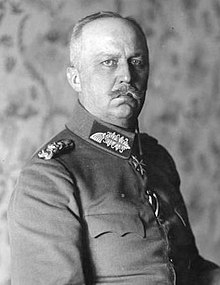
With the help of World War I General Erich Ludendorff, Hitler and the Nazis hatched a plot in which they would kidnap the leaders of the Bavarian government and force them at gunpoint to accept Hitler as their dictator.
Erich Ludendorff was known as the man of iron principles. He was born in Kruszewnia, Prussia. He was the third of six children of August Wilhelm Ludendorff and Klara Jeanette Henriette von Tempelhoff. His father was descended from Pomeranian merchants, was an impoverished land owner and cavalry captain. His mother was a member of an aristocratic military family.
He grew up on a farm and received his early schooling from his maternal aunt and had a gift for mathematics. He passed the entrance exam for the Cadet School at Plön and he did so well that he was put in a class two years ahead of his age group. He also was first in every class.
Ludendorff became an infantry officer and was soon promoted to the general staff. He was then put in charge of the 2nd department, which was responsible for preparing contingency deployment and mobilization plans.
Ludendorff met Margarethe Schmidt in a rainstorm when he offered his umbrella. Schimdt's father was a wealthy factory owner. In 1910 Ludendorff and Schimdt were married. She has divorced her previous husband to marry Ludendorff and so brought three stepsons and a stepdaughter into the picture. Ludendorff ended up being a wonderful and devoted father to those children.
He began campaigning for a strengthening of the army. His constant campaigning irritated the military authorities, and in 1913 Ludendorff was transferred to the infantry as regimental commander. When war broke out in 1914, he was appointed quartermaster in chief of the 2nd Army. When two Russian armies threatened to overrun the German 8th Army in East Prussia Ludendorff was appointed chief of staff of the 8th Army.
Ludendorff was victorious over the Russians in August 1914 at Tannenberg, in East Prussia. However, the admiration was short lived following the German defeat on the Marne in the west that signaled the failure of Ludendorff’s revised Schlieffen Plan.
In August 1916, the emperor finally appoint two generals to assume supreme military control. Ludendorff was one of those generals. In 1917 he approved the unrestricted submarine warfare against the British that led to the entry of the United States into the war against Germany. After the tsar had been deposed in March 1917, Ludendorff gave his blessing to the return of the Russian Bolshevik emigrants, in the hope of persuading the Russians to conclude peace. Ludendorff also brought about the dismissal of Chancellor Theobald von Bethmann Hollweg.
On March 21, 1918, Ludendorff opened a general offensive on the Western Front with the object of smashing the Anglo-French armies, but he had overestimated the strength of the German armies and the offensive failed. In Autumn, the collapse of the German allies—Austria-Hungary, Bulgaria, and Turkey was imminent, so Ludendorff demanded immediate negotiations for an armistice. He became highly stressed and a psychiatrist was called in. Eventually he tendered his offered his resignation, which William II accepted on Oct. 26, 1918.
Ludendorff was hidden by his brother and a network of friends until the next month when he slipped out of Germany disguised in blue glasses, a false beard and a fake Finnish passport. He settled in Sweden and wrote two volumes of detailed memoirs before being ask to leave in 1919 by the Swedish government.
Ludendorff, like many Germans, blamed the Social Democrats and leftists for the humiliation of Germany through the Versailles Treaty. Ludendorff claimed that many businesses belonging to the Jews turned their backs on the war effort by letting profit supersede.
He was appalled by the strikes that took place towards the end of the war. Most importantly, Ludendorff felt that the Triple Entente (the Russian Empire, the French Third Republic and the Great Britain) had started the war and was determined to dismantle Germany completely.
When Ludendorff returned to Berlin in 1919, he Stayed at the Adlon Hotel.
On March 12, 1920, Ludendorff was part of the 5,000 Freikorps troops (German military volunteer units made up of mercenary or private armies, regardless of their own nationality) under the command of Walther von Lüttwitz that marched on the Chancellery, forcing the government led by Friedrich Ebert and Gustav Bauer to flee the city. A new government was proclaimed with a right-wing politician, Wolfgang Kapp as new "chancellor". That arrangement didn't last very long and troops tried to overthrow Kapp. Ludendorff was a part of this movement to, but it was unsuccessful and he fled to Bavaria, where a right-wing coup had succeeded.
In May of 1923, Ludendorff met with Adolf Hitler, and soon he had regular contacts with National Socialists. Now fast forward to November.
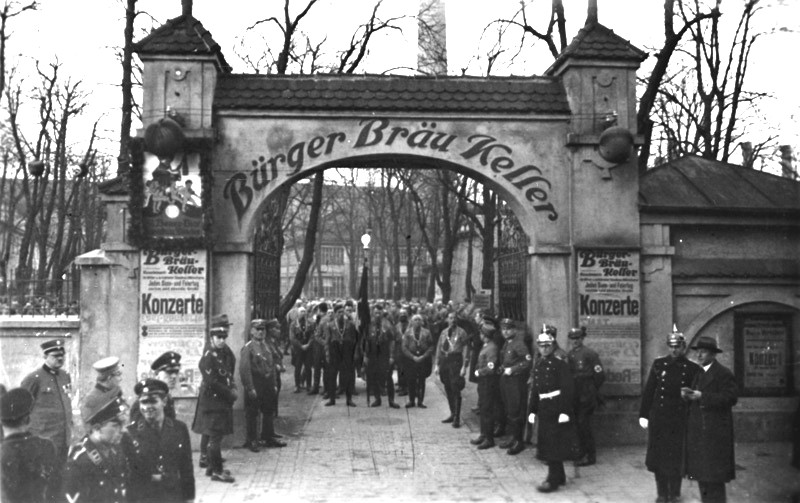
On November 8th,1923, Hitler and the Nazi troops showed up to the Bürgerbräukeller beer hall in Munich. A large gathering of businessmen were holding an event there and the guests of honor were scheduled to be the Bavarian leaders.
When Hitler and the Nazis burst in the doors panic broke out. Hitler fired his pistol into the ceiling and yelled "SILENCE" at the stunned crowd. He shoved his way to the podium where he shouted,
"THE NATIONAL REVOLUTION HAS BEGUN! No one may leave the hall."
Hitler then began spewing lies.
"Unless there is immediate quiet I shall have a machine gun posted in the gallery. The Bavarian and Reich governments have been removed and a provisional national government formed. The barracks of the Reichswehr and police are occupied. THE ARMY AND THE POLICE ARE MARCHING ON THE CITY UNDER THE SWASTIKA BANNER!"
After this rant, Hitler ordered the State Commissioner Kahr, along with the head of the state police, Colonel Hans von Seisser, and commander of the German Army in Bavaria, General Otto von Lossow into the back room. The three men did as they were told and once in the back room, Hitler informed them they were to join him in proclaiming a Nazi revolution and would become part of the new government.
Well, the three men wouldn't talk so Hitler spontaneously dashed out of the room and went back out to the podium and shouted: "The government of the November criminals and the Reich President are declared to be removed. A new national government will be named this very day in Munich. A new German National Army will be formed immediately...The task of the provisional German National Government is to organize the march on that sinful Babel, Berlin, and save the German people! Tomorrow will find either a National Government in Germany or us dead!"
When General Ludendorff arrived Hitler urged him to speak to the three men. Ludendorff convinced the trio to go along with everything. The men then went out to the podium and faced the crowd. They then pledged their loyalty to the new regime.
Hitler then spoke to the crowd once more:
"I am going to fulfill the vow I made to myself five years ago when I was a blind cripple in the military hospital – to know neither rest nor peace until the November criminals had been overthrown, until on the ruins of the wretched Germany of today there should have arisen once more a Germany of power and greatness, of freedom and splendor."
The crowd roared their approval and sang "Deutschland Über Alles."
It seemed as though Hitler finally did it, that he was going to actually be the leader of Germany. Hitler's happiness was soon dashed when he received word that attempts to take over several Army barracks. Hitler then decided he had to leave his premature celebration and go take care of things himself.
Hitler's attempt in getting the German soldiers who were holding out in the barracks to surrender was futile, so he returned to the beer hall. Once back at the hall he realized that the three Bavarian government leaders had slipped out. He also found out that basically nothing constructive had happened in his absence.
In the early morning of the next day, State Commissioner Kahr order the disbanding of the Nazi party and issued a statement blasting Hitler: "Declarations extorted from me, General Lossow and Colonel von Seisser by pistol point are null and void. Had the senseless and purposeless attempt at revolt succeeded, Germany would have been plunged into the abyss and Bavaria with it."
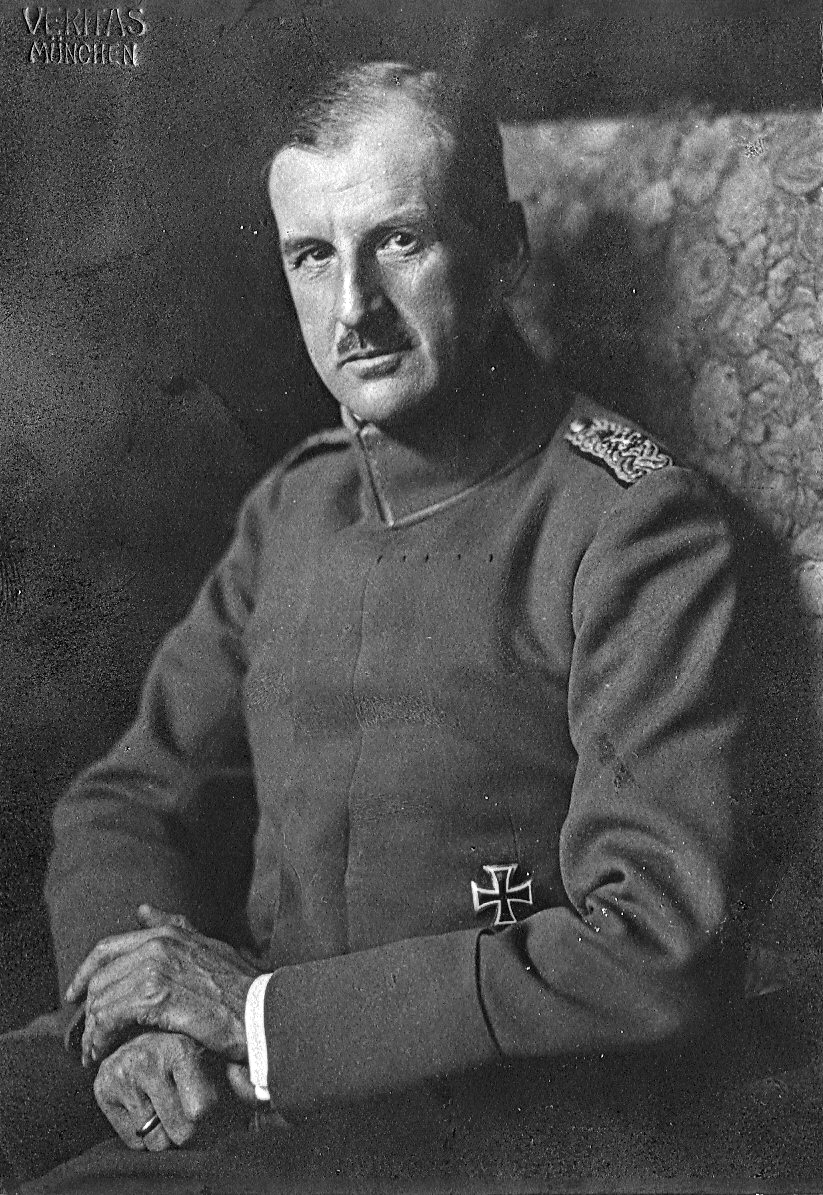
General Lossow ordered German Army reinforcements into Munich to take down the Nazi storm troopers. This gave Hitler a an idea. He decided that he was going to have the Nazis march into the middle of Munich and take it over. Ludendorff encouraged the idea and told a desperate frantic Hitler that his career was safe and that the police and the Army would likely join them.
Lather that morning a column of three thousand Nazis, led by Hitler, marched toward the center of Munich with a young Nazi recruit named Heinrich Himmler in tow.
Heinrich Himmler was born in Munich on October 7th,1900 in Munich into a conservative middle-class family. His father, Joseph Gebhard Himmler, was a pious, authoritarian Catholic schoolmaster and his mother, Anna Maria Himmler, a devout Roman Catholic.
Himmler's was named after his godfather, Prince Heinrich of Bavaria, a member of the royal family of Bavaria.
His father was deputy principal of Himmler's school. As a student Himmler was a studious, but awkward boy. While he did well in his schoolwork, he struggled in athletics due to his poor health. In his youth he trained daily with weights and exercised to become stronger.
Himmler kept a dairy of sorts in which he wrote about his interest in current events, dueling, and "the serious discussion of religion and sex". In 1915, his father pulled some strings and Himmler began training with the Landshut Cadet Corps. He enlisted with the reserve battalion of the 11th Bavarian Regiment in December 1917. While Himmler was still in training, the war ended with Germany's defeat, so he never became an officer or saw combat. After his discharge he returned to Landshut and completed his grammar-school education. From 1919–22, he studied agronomy at was is now the Technical University Munich following a brief apprenticeship on a farm and a subsequent illness.
Himmler was antisemitic and remained a devout Catholic while a student, and spent most of his spare time with members of his fencing fraternity, the "League of Apollo", oddly enough the president of which was Jewish. Himmler was polite with Jewish members of the fraternity while the antisemitism in him was stewing. During his second year at university, Himmler unsuccessfully redoubled his attempts to pursue a military career. However, he was able to extend his involvement in the paramilitary scene in Munich, this is when he first met Ernst Röhm. Himmler admired Röhm because he was a decorated combat soldier, and at his suggestion Himmler joined his antisemitic nationalist group, the Bund Reichskriegsflagge (Imperial War Flag Society).
In 1922, Himmler became more interested in the "Jewish question". Which was also referred to as the Jewish problem, was a wide-ranging debate that pertained to the appropriate status and treatment of Jews.
Himmler began reading antisemitic pamphlets, German myths, and occult tracts.
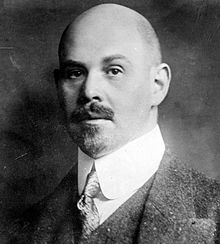
After the murder of Foreign Minister Walther Rathenau by right-wing army officers on June 24th, Himmler's political views veered towards the radical right, and he took part in demonstrations against the Treaty of Versailles.
Walther Rathenau was the first Jew to hold a cabinet post in Germany. He upset right-wing nationalists like Adolf Hitler by arguing that Germany should fulfill Germany's obligations under the Treaty of Versailles. He also upset German conservatives by negotiated the Treaty of Rapallo with the Soviet Union which re-established diplomatic relations, renounced financial claims on each other and pledged future cooperation. Leaders of the Nazi Party claimed he was part of a Jewish-Communist conspiracy.
Back to Himmler. his parents could no longer afford to pay for his schooling, so he was forced to take a low-paying job as a fertilizer salesman after obtaining his agricultural diploma.
In 1923, he the Nazi party and was a member of the Freikorps, led by Röhm which protected senior leaders of the Nazi Party at public events.
So there was Hitler marching towards Munich with Himmler and the other Nazis. After reaching the center of town, they headed toward the War Ministry building but a police blockade was in their path. They stood face to face with about a hundred armed policemen, and Hitler yelled out to them to surrender. When they didn't surrender, shots erupted from both sides only lasting about a minute. Sixteen Nazis and three police were killed. Hitler suffered a dislocated shoulder when the man he had locked arms with was shot and pulled him down onto the pavement.
Hitler's bodyguard jumped onto his back to shield him and took several bullets. Hitler then crawled along the sidewalk and jumped in a waiting car, deserting the others. The rest scattered or were arrested. Ludendorff walked right through the line of fire to the police and was then arrested.
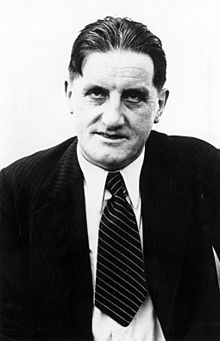
Hitler coward at his friend, Ernst Hanfstaengl's, house and talked about suicide.
Ernst Hanfstaengl was born in Munich. His father was German art publisher, Edgar Hanfstaengl. His mother, Katharine Wilhelmina Heine, was American whose father, Wilhelm Heine, was a cousin of American Civil War Union Army general John Sedgwick. When Hanfstaengl was older he moved to the United States.
He attended Harvard University and became acquainted with Walter Lippmann and John Reed. Hanfstaengl was a gifted pianist and composed several songs for Harvard's football team. He graduated in 1909.
He moved to New York City and took over the management of the American branch of the Franz Hanfstaengl Fine Arts Publishing House. He would practice on the piano at the Harvard Club of New York, where he became acquainted with both Franklin and Theodore Roosevelt.
When World War I broke out, he asked the German military attaché in New York Franz von Papen to smuggle him back to Germany, but Papen refused. After 1917, the American branch of the family business was confiscated as enemy property.
In 1922, Hanfstaengl returned to the place of his birth. He first heard Hitler speak in a beer hall there. A fellow member of the Harvard Hasty Pudding club who worked at the U.S. Embassy asked Hanfstaengl to assist a military attaché sent to observe the political scene in Munich. The attaché, Captain Truman Smith, suggested that Hanfstaengl go to a Nazi rally as a favor and report his impressions of Hitler. Hanfstaengl was fascinated by Hitler.
"What Hitler was able to do to a crowd in 2½ hours will never be repeated in 10,000 years," Hanfstaengl said.
Hanfstaengl introduced Hitler to Munich high society and helped him out with his image. He also helped to finance the publication of the NSDAP's official newspaper. Hitler was the godfather of Hanfstaengl's son Egon.
So back to Hitler. He was hiding out in the attic of Hanfstaengl's house. Hanfstaengl talked him out of suicide. On the third night, police arrived and arrested Hitler. They took him to the prison at Landsberg where he was told he was going to get a public trial for high treason.




